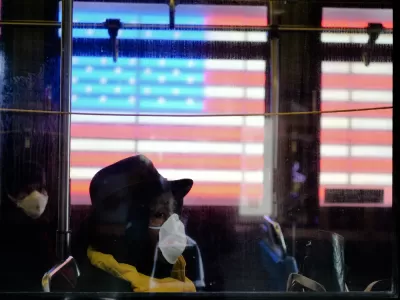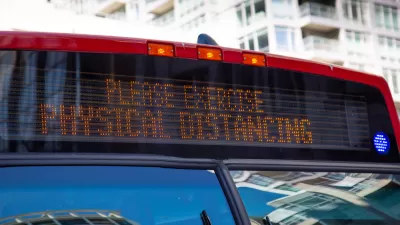After months of nothing but news of service cuts, plummeting ridership, and cratered budgets, a few U.S. transit agencies are now making plans to restore service with new social distancing guidelines in place.

Paul J. Wiedefeld, general manager and CEO of the Washington Metropolitan Area Transit Authority, writes for The Washington Post to explain that transit system's plans to reopen as the region slowly emerges from stay-at-home orders and some workers return to work.
Metro ridership has plummeted to historic lows and that’s a good thing — for now. Customers are making only essential trips to protect the health of everyone in the region. Planning for recovery from the covid-19 shutdown isn’t like reopening after a blizzard. This is not a “start your engines” moment. This principle guides our plans to implement phased recovery over the next 12 months.
The Metro system is currently only using half of its frontline employees, according to Wiedefeld, who claims the agency, working with its employee union, has worked rigorously to protect the health of employees during the public health crisis. Wiedefeld also states that the first job of the system's recovery plan will be to protect the health and safety of its workforce.
Second, the plan will consider customer expectations regarding masks, cleaning, and efforts to reduce crowding on high demand routes at peak times. "Our recovery plan anticipates that when regional leaders move to the first phases of reopening, trains will run every 20 minutes. The first and eighth cars, which have been closed to passengers, will reopen. Buses will continue to operate on Sunday routes and schedules."
Later on, depending on the timing of subsequent phases in Maryland, Virginia and the District, Metro "will begin to reopen stations, increase train frequency and operate more bus routes later this summer and into the fall," according to Wiedefeld.
More news coverage of the transit reopening plan for the D.C. region are included in an article by Jordan Pascale for WAMU. Seattle's King County Metro has also revealed its plans to begin restoring transit service with new considerations for social distancing and the health and safety of both riders and transit employees in place.
FULL STORY: How Metro plans to gradually return to full service

Planetizen Federal Action Tracker
A weekly monitor of how Trump’s orders and actions are impacting planners and planning in America.

Congressman Proposes Bill to Rename DC Metro “Trump Train”
The Make Autorail Great Again Act would withhold federal funding to the system until the Washington Metropolitan Area Transit Authority (WMATA), rebrands as the Washington Metropolitan Authority for Greater Access (WMAGA).

The Simple Legislative Tool Transforming Vacant Downtowns
In California, Michigan and Georgia, an easy win is bringing dollars — and delight — back to city centers.

The States Losing Rural Delivery Rooms at an Alarming Pace
In some states, as few as 9% of rural hospitals still deliver babies. As a result, rising pre-term births, no adequate pre-term care and "harrowing" close calls are a growing reality.

The Small South Asian Republic Going all in on EVs
Thanks to one simple policy change less than five years ago, 65% of new cars in this Himalayan country are now electric.

DC Backpedals on Bike Lane Protection, Swaps Barriers for Paint
Citing aesthetic concerns, the city is removing the concrete barriers and flexposts that once separated Arizona Avenue cyclists from motor vehicles.
Urban Design for Planners 1: Software Tools
This six-course series explores essential urban design concepts using open source software and equips planners with the tools they need to participate fully in the urban design process.
Planning for Universal Design
Learn the tools for implementing Universal Design in planning regulations.
Smith Gee Studio
City of Charlotte
City of Camden Redevelopment Agency
City of Astoria
Transportation Research & Education Center (TREC) at Portland State University
US High Speed Rail Association
City of Camden Redevelopment Agency
Municipality of Princeton (NJ)




























